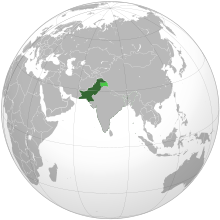Pakistan’s New Prime Minister And The Political Impasse – Analysis
By IPCS
By Aryaman Bhatnagar
Raja Pervez Ashraf has been appointed the new Prime Minister of Pakistan following the dismissal of his predecessor, Yusuf Gilani, by the Supreme Court. Gilani was declared ineligible for the post following his conviction on 26 April 2012 on charges of contempt of court. This was for refusing to follow court instructions over handling of the corruption cases against President Asif Ali Zardari – writing a letter to the Swiss authorities to reopen the cases. Does the appointment of a new Prime Minister mean an end to the political tussle between the judiciary and the civilian government?

In a region, where the image of most public institutions are tarnished by corruption and general incompetence, the Supreme Court of Pakistan draws its strength, legitimacy and, to a large extent, its popularity from its fight against the political elite of the country. The court’s campaign against corruption has not only rattled the political leadership, especially the Pakistan People’s Party (PPP), but has also put forth the Supreme Court as a force to be feared and respected.
The Supreme Court, in line with its own self-image, is likely to target Prime Minister Ashraf as well. Ashraf is a controversial choice as he is battling corruption charges for receiving kickbacks on Rental Power Projects – the construction of electricity plants, which were privately financed –during his tenure as the minister for water and power between 2008 and 2011 and has already been questioned by the National Accountability Bureau. The proceeds from such bribes – which led to the name ‘Rental Raja’ – were then allegedly used to finance property purchases in London. The possible targeting of Ashraf, however, may be motivated by factors other than just a desire to fight corruption among the highest echelons of power.
First, there is the issue of the personal enmity between Chief Justice Iftikhar Chaudhry and Zardari. This is evident from the fact that although there are over 8,000 individuals, who had received a pardon for their crimes under the National Reconciliation Ordinance (NRO), issued by the then President General Pervez Musharraf, only Zardari has been targeted in such a manner by the court. The rift between the two dates back to 2009, when Zardari delayed the reinstatement of Chaudhry until his hand was forced by a surge of public opinion. Shortly thereafter Chaudhry nullified the NRO and reopened the cases against Zardari. According to Moeed Yusuf, South Asia advisor at the United States Institute of Peace, “the Supreme Court is obsessed with the letter” and is not going to let the issue die down very easily(The New York Times, 22 June 2012). The court has already issued a notice to Ashraf giving him till 12 July to indicate whether he would write the letter to the Swiss authorities; Ashraf, meanwhile, has defended the immunity granted by the NRO to the President. Hence, it is likely that Chaudhry’s struggle with Zardari is going to continue, while Ashraf will be made the scapegoat, just as Gilani.
The timing of Gilani’s dismissal also raises questions about the motives of the court. Chaudhry’s son Arsalan Iftikhar has been accused of intimidating and taking bribes from Malik Riaz Hussain to influence cases in his favour. The Chief Justice’s prestige and reputation was on the line as he was called to explain his own personal finances. Moreover, the fact that Hussain is close to the PPP, it has been alleged that the accusations against Arsalan Iftikhar were part of a government-led conspiracy to malign the court and the Chief Justice. The dismissal could have then been a possible diversionary tactic to remove the spotlight from the Chief Justice and to turn the tables on Zardari and weaken the PPP-led government. It is possible that Ashraf would be targeted to further sideline the accusations against the Chaudhrys.
Finally, the role of the military, which has often colluded with the judiciary to target elected governments, cannot be ignored. Relations between them and the PPP, which were never good at the best of times, have taken a turn for the worse following the Memogate scandal. It is no secret that the military would like to see the current government fall and be replaced by its protégé, Imran Khan. However, as the present domestic climate in Pakistan is not conducive to a military coup, the army is unlikely to stage one. It may settle for covertly giving its blessings to the ‘judicial coup’ and support further actions of the Court that could possibly lead to early elections. The fact that a non-bailable warrant was issued against the PPP’s initial choice – Makhdoom Shahabuddin – on charges levelled by the Anti-Narcotics Force which is run by the Army, may be indicative of such collusion.
Gilani had seemed on course to become the first Prime Minister in Pakistan’s history to complete a full-term in office prior to his dismissal. It now may become difficult for the PPP to even hold-off early elections as the impasse between the judiciary and the civilian government is likely to continue.
Aryaman Bhatnagar
Research Officer, IPCS
email: [email protected]

Well analyzed article.It seems the present govt. may not last its tenure.Political situation in Pakistan will remain as it is.
In Pakistan,no judge can muster the courage to summon an Army Major. Even if, the high & mighty SC summons an Army Major, he does’nt turn up. Can the same court go after the President, PM, the next nominated PM, thereafter the next PM who takesover without recieving orders from the Army???